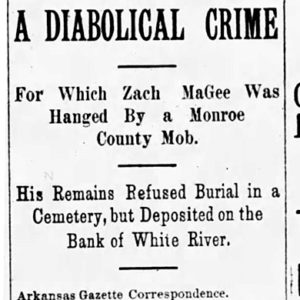calsfoundation@cals.org
Leach Magee (Lynching of)
On June 4, 1887, an African-American man named Leach Magee (sometimes referred to as Zach Magee) was hanged in Clarendon (Monroe County) for allegedly assaulting a woman named Mrs. J. M. Park, a relative of Sheriff J. W. B. Robinson. Neither Mrs. Park nor Leach Magee appear in any public records for Monroe County. In 1880, a single man named James W. B. Robinson, age twenty-four, was farming in Pine Ridge Township. County records indicate that he was sheriff in Monroe County from 1886 until 1890. He apparently later moved to El Paso, Texas, where he died in 1928.
The first account of the alleged assault appeared in the Arkansas Gazette on June 3. It said that, on June 2, Magee reportedly attempted to rape Mrs. Park, the aunt of Sheriff J. W. B. Robinson. On June 8, the Gazette published a much more complete account of events. According to its report, twenty-one-year-old Magee had been jailed the previous winter for not paying a fine. J. M. Park agreed to pay his fine if he would work on Park’s farm. While he was working for Park, Magee “deported himself well and made a favorable impression on the people generally.” On Thursday, June 2, Park asked Magee to scrape cotton in one of his fields while he went to work in another field. Magee reportedly tied his mule in the woods a short distance away, and he noticed Mrs. Park doing laundry in the yard. According to the Gazette, Magee “threw a towel over her head to avoid recognition…[and] threw her down, she having presence of mind enough to fall upon her face, and in trying to turn her over the hell-born wretch broke her collar-bone, scratched her face, and bit a large piece of flesh almost out of her shoulder.” A boy heard her scream, and Magee ran. Neighbors soon captured him and took him to the jail. The Wichita Eagle reported that there was much excitement in Clarendon, but that excitement “apparently subsided through the efforts of the sheriff and the presence of a determined posse.”
On the night of the June 4, however, Magee was removed from the jail by a mob of forty men and hanged from a tree in a grove near the courthouse. After the lynching, black residents of the area declined to bury him, saying he was “a disgrace upon their people,” and a group of white men buried him on the bank of the White River. According to the Gazette, the lynching happened quietly, with no “fuss or hurrah.…The affair is regarded by both white and black as being just and nothing is being said. The coroner’s jury returned a verdict in accordance with the above facts.” The lynching was considered yet another illustration of that unwritten law, “which lies in the strong hearts of men, and who have always demonstrated that female virtue must and shall be protected, regardless of the price that has to be paid.”
For additional information:
“A Diabolical Crime.” Arkansas Gazette, June 8, 1887, p. 2.
“Halter and Bullet: A Rapist Strung Up.” Wichita Eagle, June 7, 1887, p. 1.
“Hung by a Mob.” Arkansas Gazette, June 7, 1887 p. 1.
“A Negro’s Brutal Intent.” Arkansas Gazette, June 3, 1887, p. 1.
Nancy Snell Griffith
Davidson, North Carolina
 Civil Rights and Social Change
Civil Rights and Social Change Post-Reconstruction through the Gilded Age, 1875 through 1900
Post-Reconstruction through the Gilded Age, 1875 through 1900 Leach Magee Lynching Article
Leach Magee Lynching Article 




Comments
No comments on this entry yet.